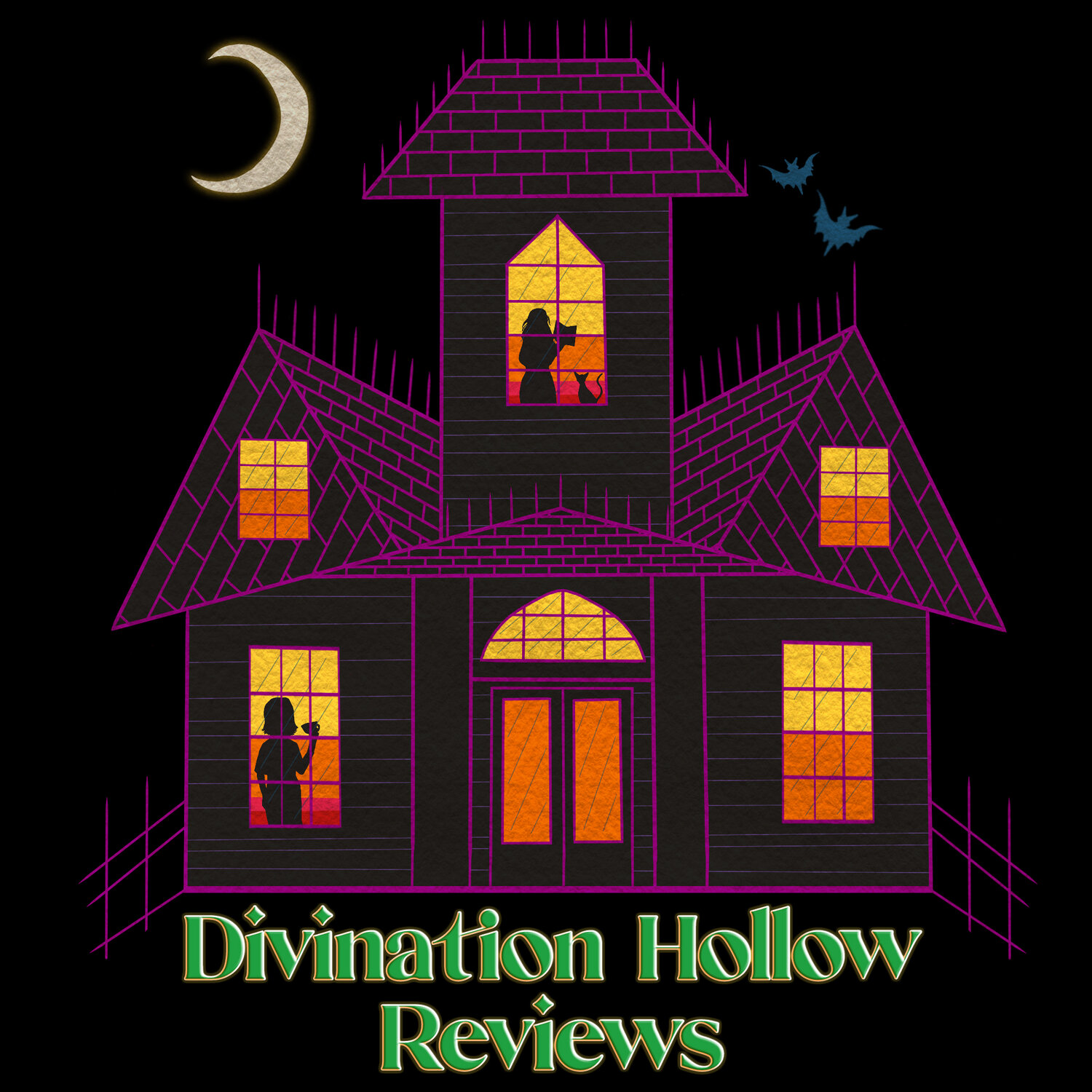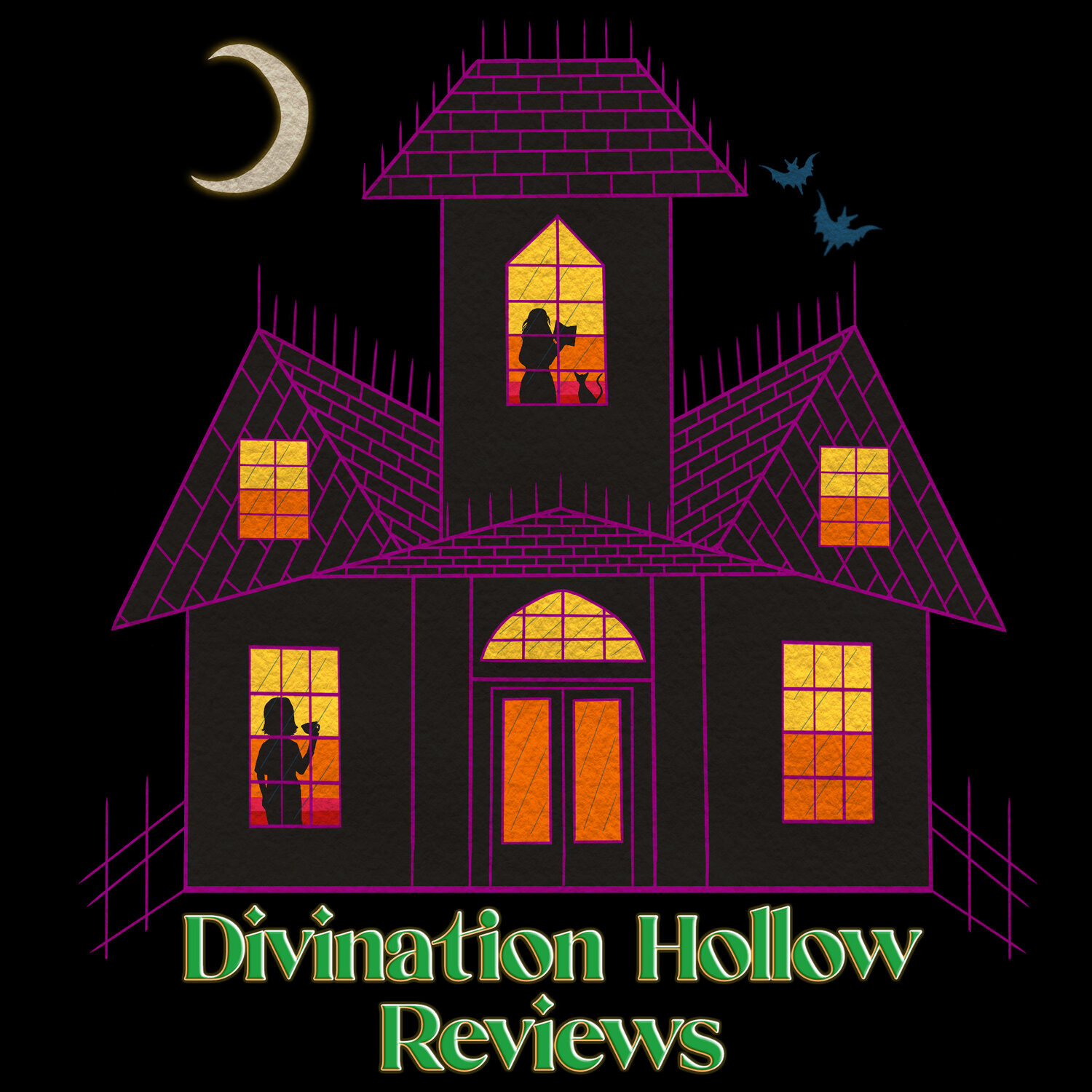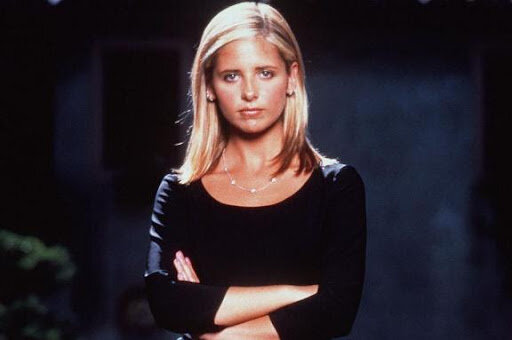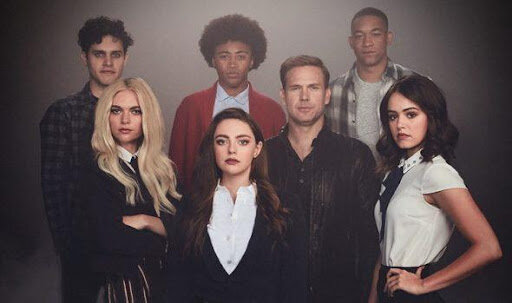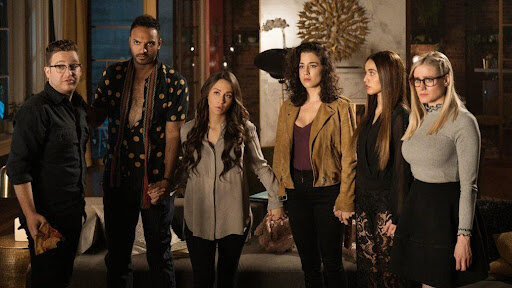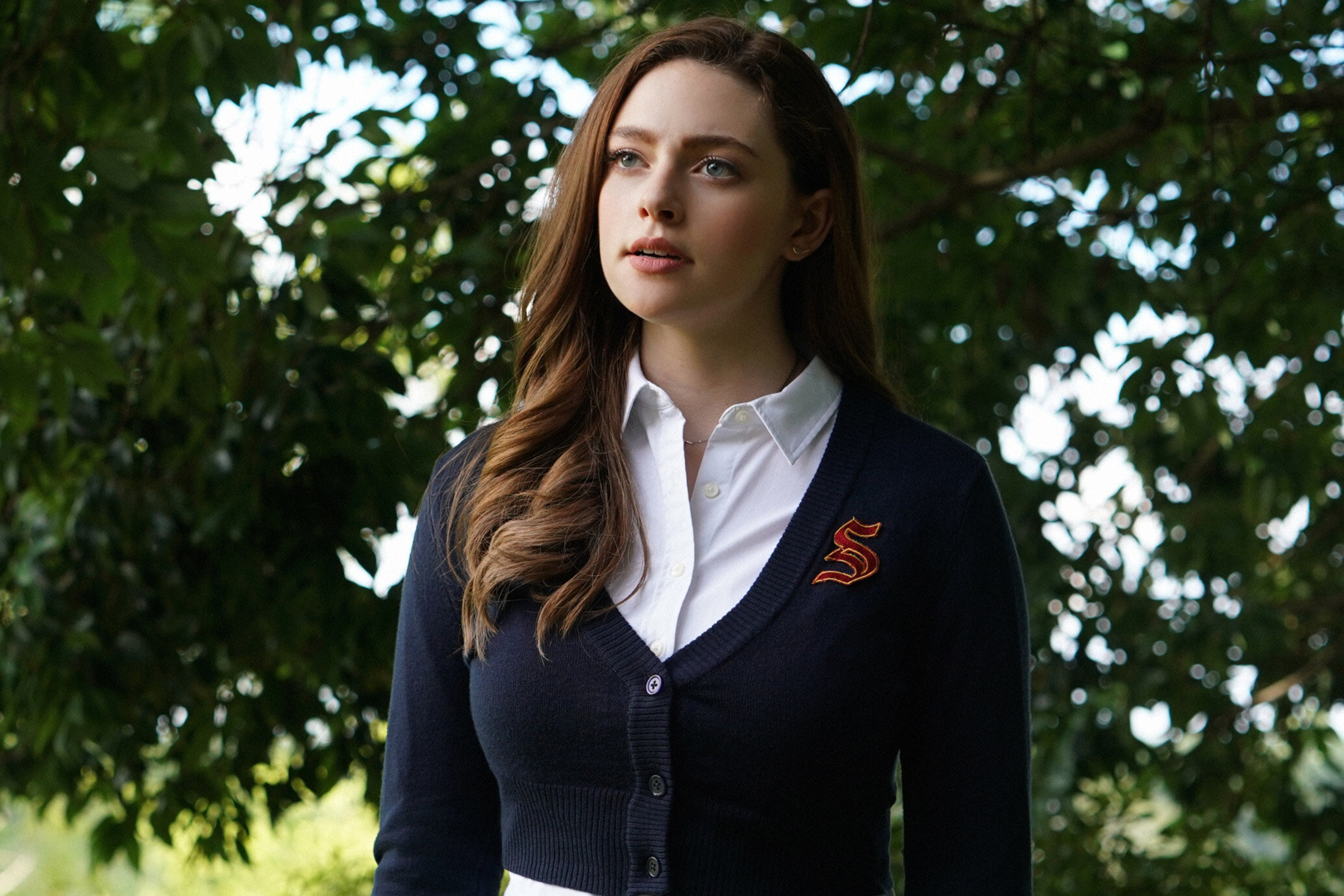Dark Academia Month: “From Young to New: the Shift in Supernatural TV”
From Young to New: The Shift of Supernatural TV
I love a good, solid supernatural drama. Give me any sort of paranormal creature, give me universal themes and maybe sprinkle in a bit of romance, and I am hooked. Yet there has been a shift in the realm of the supernatural over the last few years, especially in regards to location and, quite possibly, age range, the kind TV has embraced and publishing seems to have just…dismissed in the more speculative genres.
Let’s start back in the 90s, shall we? When I was a little Ellie who could either be found watching ‘her’ TV or putting up with what her brothers liked. Luckily, her brothers had good taste, and fed into her a love of things outside the realm of possibility, even if The X-Files theme scared her so much she couldn’t even sit in a room when it was on, probably because of the knowledge X-Files = Aliens, and yes, her brothers had somehow got her to watch the alien autopsy video at some point which caused many nightmares and a deep fear of little green/grey men. But occasionally there were also the shows she watched that the boys would somehow found themselves hooked on.
Okay, I’ll stop referring to myself in third person now.
There were a few shows around back then which dealt with some sort of paranormal being dealing with the everyday life of being a child or teenager while also having to attend school. There were a couple of British kids’ TV shows dealing with this, but it’s two US shows that particularly stand out to me, and they compliment each other fairly well. Both deal with ‘All American’ teenage girls – white, blonde, cis, het, dealing with the ‘typical’ teenage girl trappings of school, makeup, boys, and fussy parental figures.
I am, of course, talking about Sabrina (the teenage witch) and Buffy (the teenage vampire slayer). Sabrina ran from 1996 to 2000, and started with a film as the pilot, though there were a fair number of changes made between the film and TV show. Buffy ran from 1997 to 2003, with the film having come out in 1992 and being vastly different from the TV series many of us would come to know and love.
Both shows have the protagonist trying to live a normal life alongside their secret one, but keeping them set in a school works well. A school is a contained setting, a community in itself, but which allows for ‘branching out’ occasionally. It also ensures a relatability with the target audience – school is part of everyday life for children and teenagers, and along with a school comes frustration with parents and teachers, and moments where the audience recognise elements of their own lives in the shows themselves. But audiences grow up, and to keep up with the audience, the shows eventually had Buffy and Sabrina graduate from High School and move to the next step of their lives: college.
Progression to college also allows the world of the show to open up more. Of course, Sabrina fans may have skewed a bit younger than the show’s protagonist, but there’s still an element of relatability, as many in the audience would be looking forward to their own college years, and watching these characters learn to live in a new setting could be sort of comforting. It wasn’t only the supernatural shows that did this, either – Boy Meets World took their characters from the high school to college in later series, too.
It's something that is sort of overlooked in a later supernatural YA series. The Vampire Diaries aired from 2009 to 2017, with 8 seasons in total. The series initially focused on Elena, who falls in love with vampire Stefan and becomes involved in a love triangle between him and his brother. At the start, Elena attends school (as does Stefan), and again, tries to handle a normal life alongside the supernatural. Her best friends eventually get drawn into the world, but unlike Sabrina, Elena isn’t part of the supernatural herself. She is adjacent to it. We see the characters grow up and, eventually, graduate from school, but the school aspect becomes less and less important as the series goes on. And though Elena does attend college, this doesn’t really last long, and the college setting isn’t fully explored. (Spoilers ahead) But, crucially, the focus shifts away from Elena, too, able to do so largely because, unlike Sabrina and Buffy, she is not the title character. And in some ways (to me, anyway) the series was a touch better for Elena’s absence, though it’s weaker moments in the Elena-less seasons are when they try to shoehorn in some aspect of her. (Constant references, for example, to Damon’s new ‘love interest’ looking like Elena. She really, really doesn’t.) Through the seasons, Elena does shift from being part of the supernatural to not, and it feels after the first few that the writers didn’t really know what to do with her.
The Vampire Diaries has two spin off shows – The Originals, which is focused purely on Adult characters and therefore doesn’t require an academic backdrop, and the ongoing Legacies, which brings together characters and storylines from both TVD and Originals. Legacies is set at a school, but crucially this is a boarding school, eliminating outside influence, and unlike the previous shows, all of the students shown here are supernatural beings themselves. There are witches, werewolves and vampires, who must all try to get along, and rather than trying to live a life of normality, they’re learning about magic and their powers, and how to control them.
So, we now have two sides to the school setting for supernatural TV shows. Ones in which the protagonist has to life a dual life, keeping up with normality maybe even while at home, which comes with an addition of needing to protect family who are in the dark, and an academic setting where the protagonist does not need to hide who they are, at least not while at school.
The school setting works really well for supernatural-based shows – it’s a contained area, with the same people coming and going day in, day out. There are also mysteries that can be built up easily around teachers and other students, new characters can easily be introduced, and teenagers are pretty good at keeping things hidden from their teachers and parents anyway. However, it can maybe become a little too contained and stale. How many students from the same school can go missing or be killed before something is actually done about it? Some of the series’ previously mentioned take their protagonists through school and into college, but there are two more recent TV shows which did away with the school aspect all together, starting with their protagonists either entering university/college, or about to do so.
First, let’s take a look at The Order. This series ran for two seasons, 2019 – 2020, focusing primarily on the protagonist Jack Morton. By having a series set at a college instead of a school, the characters are instantly granted more freedom. It also shifts the age from Young to New Adult, and allows the shows to explore more Adult themes in a wider context. There’s also more interaction with adult characters outside an authority or family role. In this series, Jack’s aim in attending college isn’t to gain a degree, but to enact revenge on the man he believes killed his mother. To do this, he must find and join the secret magical order on campus. But complications arise when he gets turned into a werewolf, and finds out werewolves and witches are natural enemies. We have various aspects joining together here. Jack lives a dual life, with one foot in each camp, but this is less about him trying to have a ‘normal college experience’ than trying to make sure neither of his supernatural sides collide, while also trying to maintain secrecy among those unaware of either magic or werewolves.
The other supernatural college drama worth mentioning is The Magicians, though uniquely it has even older characters. Brakebills, the university in the show, doesn’t take in undergrads – instead, Quentin and Julia are introduced to the world when they are looking to proceed with their post-graduate degrees. I could do a whole thing about how good this show is, as characters grapple with what magic can and cannot do, highlighting issues of consent and trauma. But for the purposes of this, let’s stick with the setting and how different it is from all those shows previously mentioned.
Actually, its closest comparison with the teen shows is Legacies. Which in itself is full of characters who have gone through a lot of trauma, though that tends to be due to them being vampires or witches or werewolves. In The Magicians, a character doesn’t necessarily have to have innate magical ability to use magic. But magic is drawn to those who have trauma. It’s opened up more than other similar concepts – it’s not about the family someone is born into, or having money, or the random quirk of being born with magic to non-magical parents. The Magicians is very much grounded in the real world, including a lot of pop culture references – those who aren’t aware of magic are called ‘muggles’, and there’s an excellent scene where two characters use pop culture references in order to speak in code.
Like The Order, having older characters enables The Magicians to deal with different themes and ideas than their Young Adult counterparts. In shows aimed at teenagers, everything has to have a particular context. Alcohol is consumed illegally and mainly at illicit parties. Sex takes place in the context of relationships. Sometimes, shows have to be seen to be demonstrating certain things are bad, actually.
The Order kind of borders the two – the characters are still young, freshly out of high school, but there are slightly older characters who are shown to be casually drinking. In both shows, too, sexuality isn’t used as a plot point, or to ‘say something’. Queer characters are simply queer. And in The Magicians especially, we see characters drinking, taking drugs, and having casual sex, as normal adults do. The advantage here is that the characters are in their early twenties – they’re not dealing with the same sort of ‘drama’ teenagers have to, but they’re still young enough to not completely know what they’re doing, make mistakes that have sometimes devastation consequences, and to still think they know best and ignore the adults and authority figures around them, or seek help when it’s too late.
The university/college setting also allows more scope. Tutors are not treated like teachers. There are less authority figures. The Order has young people living away from home for the first time, and in The Magicians, it might not be their first time away from home, but the addition of magic comes with more possibilities, and many characters use that to their advantage, as opposed to shows where a magical character has to hide that aspect of their self from, say, a non-magical roommate.
So, the college setting works for similar reasons the high school setting does, while allowing more scope. It also enables a branching out into the ‘real world’ – unlike a high school, students at college are not from the same town. More diversity can be introduced in terms of backgrounds, and there are chances to introduce new settings via trips home. The Magicians also fully embraces the idea of post-college life, showing ways in which magic is used in the real world. ‘Students’ can have off-campus jobs, and plotlines can take them more beyond the academic setting than high school settings usually can.
The Magicians also utilizes the idea of a second world fantasy. It plays with tropes really well in a way the other shows don’t, continuously providing commentary on the hero’s journey and the cis het white male hero, and it is able to do so because of the New Adult setting. The characters explore sexuality, drugs, alcohol, trauma, sexual assault, consent, relationships – both platonic and romantic – sex in general and other themes in a way they would be unable to do so if this was set at a high school.
It's interesting – clearly college/university is a fertile breeding ground for these stories, and while TV seems to have shifted in the direction of ‘New Adult’, publishing doesn’t seem to have utilized it half as well. Yet surely there is a market for it – many enjoy the book series for The Magicians, and even if they weren’t labelled ‘New Adult’, there are many readers who would likely enjoy the higher educational setting, with it offering a branch between Young Adult and older books in speculative fiction.
But we’ll see. In the meantime, hopefully other series will pop up using college/university in interesting ways, as neither The Order or The Magicians were renewed – but maybe it’s a sign TV is a little bit too similar to publishing in not taking advantage of ‘New Adult’, too.
The other supernatural college drama worth mentioning is The Magicians, though uniquely it has even older characters. Brakebills, the university in the show, doesn’t take in undergrads – instead, Quentin and Julia are introduced to the world when they are looking to proceed with their post-graduate degrees. I could do a whole thing about how good this show is, as characters grapple with what magic can and cannot do, highlighting issues of consent and trauma. But for the purposes of this, let’s stick with the setting and how different it is from all those shows previously mentioned.
Actually, its closest comparison with the teen shows is Legacies. Which in itself is full of characters who have gone through a lot of trauma, though that tends to be due to them being vampires or witches or werewolves. In The Magicians, a character doesn’t necessarily have to have innate magical ability to use magic. But magic is drawn to those who have trauma. It’s opened up more than other similar concepts – it’s not about the family someone is born into, or having money, or the random quirk of being born with magic to non-magical parents. The Magicians is very much grounded in the real world, including a lot of pop culture references – those who aren’t aware of magic are called ‘muggles’, and there’s an excellent scene where two characters use pop culture references in order to speak in code.
Like The Order, having older characters enables The Magicians to deal with different themes and ideas than their Young Adult counterparts. In shows aimed at teenagers, everything has to have a particular context. Alcohol is consumed illegally and mainly at illicit parties. Sex takes place in the context of relationships. Sometimes, shows have to be seen to be demonstrating certain things are bad, actually.
The Order kind of borders the two – the characters are still young, freshly out of high school, but there are slightly older characters who are shown to be casually drinking. In both shows, too, sexuality isn’t used as a plot point, or to ‘say something’. Queer characters are simply queer. And in The Magicians especially, we see characters drinking, taking drugs, and having casual sex, as normal adults do. The advantage here is that the characters are in their early twenties – they’re not dealing with the same sort of ‘drama’ teenagers have to, but they’re still young enough to not completely know what they’re doing, make mistakes that have sometimes devastation consequences, and to still think they know best and ignore the adults and authority figures around them, or seek help when it’s too late.
The university/college setting also allows more scope. Tutors are not treated like teachers. There are less authority figures. The Order has young people living away from home for the first time, and in The Magicians, it might not be their first time away from home, but the addition of magic comes with more possibilities, and many characters use that to their advantage, as opposed to shows where a magical character has to hide that aspect of their self from, say, a non-magical roommate.
So, the college setting works for similar reasons the high school setting does, while allowing more scope. It also enables a branching out into the ‘real world’ – unlike a high school, students at college are not from the same town. More diversity can be introduced in terms of backgrounds, and there are chances to introduce new settings via trips home. The Magicians also fully embraces the idea of post-college life, showing ways in which magic is used in the real world. ‘Students’ can have off-campus jobs, and plotlines can take them more beyond the academic setting than high school settings usually can.
The Magicians also utilizes the idea of a second world fantasy. It plays with tropes really well in a way the other shows don’t, continuously providing commentary on the hero’s journey and the cis het white male hero, and it is able to do so because of the New Adult setting. The characters explore sexuality, drugs, alcohol, trauma, sexual assault, consent, relationships – both platonic and romantic – sex in general and other themes in a way they would be unable to do so if this was set at a high school.
It's interesting – clearly college/university is a fertile breeding ground for these stories, and while TV seems to have shifted in the direction of ‘New Adult’, publishing doesn’t seem to have utilized it half as well. Yet surely there is a market for it – many enjoy the book series for The Magicians, and even if they weren’t labelled ‘New Adult’, there are many readers who would likely enjoy the higher educational setting, with it offering a branch between Young Adult and older books in speculative fiction.
But we’ll see. In the meantime, hopefully other series will pop up using college/university in interesting ways, as neither The Order or The Magicians were renewed – but maybe it’s a sign TV is a little bit too similar to publishing in not taking advantage of ‘New Adult’, too.
Article by Elle Turpitt
Twitter & Instagram: @elleturpitt
